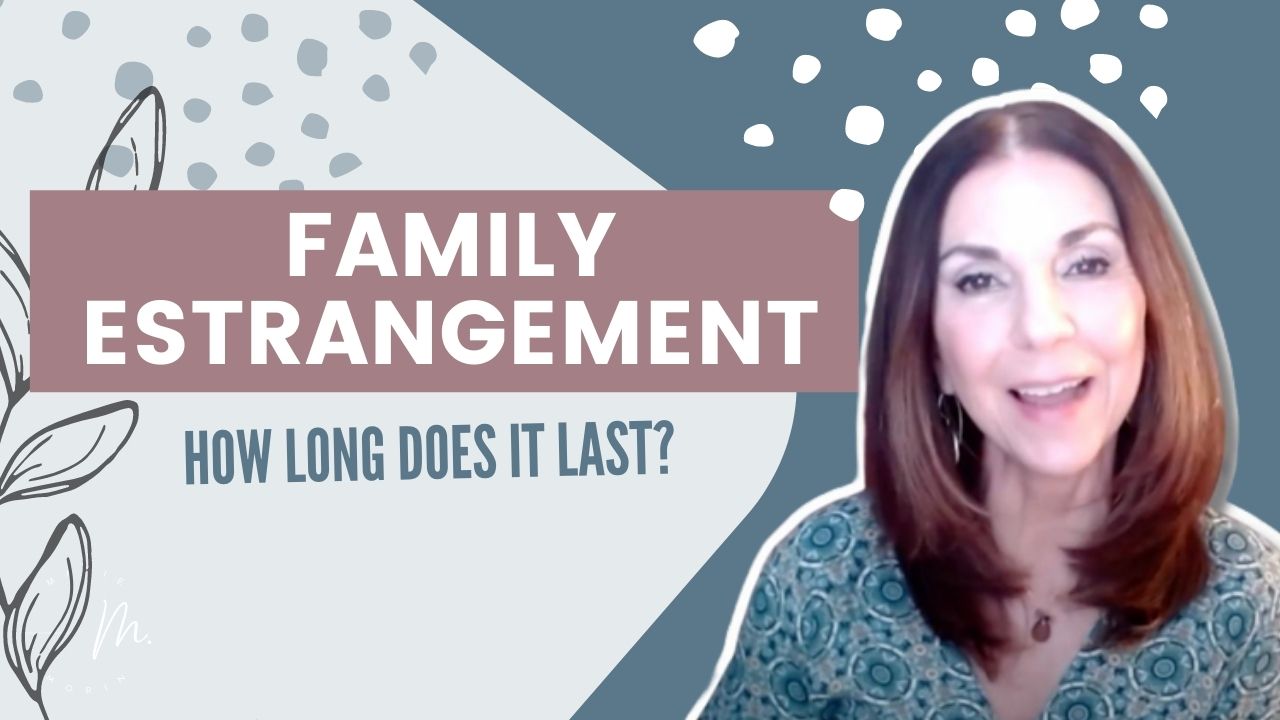Estrangement and Reconciliation
If you are here, you may be wondering how long will family estrangement last?
Family estrangement is when one member intentionally decides to detach from others. Parting creates an emotional and or physical distance that is emotionally troublesome for all involved. The length of estrangement and when it will end also varies. Family dynamics, present and past behaviors, abuse, and perceptions of the estranged and the initiator of estrangement can impact separation length. Many estranged individuals question when there might be reconciliation.
On average, family estrangement can last 54 months or 4.5 years. Dr. Pillemer interviewed 1600 estranged family members, with 85% estranged for a year or more. Half of the respondents had no contact for four or more years. This article discusses the question How long does family estrangement last? And reconciliation with abusive estrangement.
Family estrangement hits more than one-quarter of the U.S. population, and with all the shame and secrecy it causes, the actual number is likely much higher. The condition of being cut-off causes physical and emotional harm to all parties. The complicated nature of the process and elements of estrangement are as varied as the individual stories with no one-size-fits-all solution.
It would be disrespectful for all perspectives of estrangement to suggest that there is one way to arrive at the desired outcome. Due to the many layers of family rifts, it is essential to gain insight into other perspectives, current research, clinical experience, and the stories of the estranged.
Family dysfunction, divorce, parental alienation, money, mental illness, differing values and choices, and other factors can explain why individuals estrange. Cutting off that results from an abusive relationship are a means to protect the distanced from other harmful behaviors and experiences.
When abuse exists in a relationship, cutting ties is necessary so that the abused finds safety. Parents, children, grandparents, siblings, aunts, and uncles can be abusive. Sometimes abuse is at the core of estrangement. Cutting off, in some cases, can be used as an act of abuse.
Reconciliation In Cases of Abuse
Cutting off from an abusive family member is recommended to preserve the well-being of the abused. The impact of abuse includes depression, anxiety, insecurity, cognitive impairment, and complex trauma. Emotional abuse consists of the abuser’s use of criticism, isolation, and control to break down the family member’s sense of self and autonomy.
Family emotional abuse can often occur insidiously where the abused is unaware that their abuser’s behavior is harmful to them. The abusive behaviors may be manipulation, withholding love and affection, unpredictable anger, and pitting one family member against the other.
Physical abuse can include hitting, kicking, sexual inappropriateness, and aggressive actions. The family dynamic can be typically dysfunctional and unhealthy for members to thrive independently and within the family.
When considering the possibility of reconciling with an emotionally and or physically abusive great care is required. Counseling can assist in creating boundaries, making sense of what happened and what continues to happen, and learning how to regain and develop a healthy identity away from the abuser.
Therapy is an opportunity to talk with a trusted professional who will listen to your concerns. When there is abuse, consider taking positive steps forward towards healing with the help of a therapist. Reconciling may only be possible if the abuser is willing to work with a family therapist.
Consider if it is safe to resume a relationship with an abusive family member without evidence that the abuser has changed or takes responsibility for their harmful actions.
When there is a history of abuse, the notion of reconciling requires the professional guidance of a therapist and insight into the abuser’s recognition of their behaviors. More to the point, therapeutic work is essential for both parties and the assurance of future emotional and physical safety. Kylie Agllias, researcher, and educator, in her book Family Estrangement A Matter Of Perspective, explains that commitment, insight, and integrity are needed to reestablish trust.
Individual perceptions further complicate estrangement’s complex nature. Some accused abusers have little or no insight into their abusive behaviors. Others will perceive their behaviors were not as their accuser remembers. In his book Rules of Estrangement, Joshua Coleman discusses that the perception of abuse recently has changed to include a broader range of behaviors.
Perceptions of what happened within the estranged relationship differ significantly. Often these different viewpoints have aggravated the relationship and escalated the need for estranging.
How Long Will Family Estrangement Last?
The perceptions of the estranged may include little or no insight into their involvement in the estrangement. The opposing assessment that physical and or emotional distance is necessary, is remarkably different.
Dr. Karl Pillemer, in his book, Fault Lines Fractured Families and How to Mend Them, includes family members’ reconciliation stories. Pillemer found that the common thread was the ability to abandon their need to align their versions of the past.
Interestingly, Dr. Pillemer often heard how the estranged wanted the other to see the “reality” or “see the light” of what had occurred that caused the other to distance. Another obstacle is the requirement of an apology for a “reality” the other did not align with or recognize.
For example, one or both parties are waiting for the other to apologize and are stuck needing the other to agree with their version of the past. These individuals were stuck in dysfunction, discord, and the past.
However, Dr. Pillemer states that overcoming the rift requires learning how old ways and communication have changed. Reconcilers were able to abandon the need for an apology and build a future that leaves the past behind.
Estrangement is a complex topic that deserves to come out of the shadow of secrecy. Estrangement is the state of being alienated or separated in feeling or affection, a state of hostility and unfriendliness. The spectrum of estrangement and its multifaced and complex condition deserves more research and attention.
The complicated nature of the process and elements of estrangement are as varied as the individual stories with no one-size-fits-all solution. It would be disrespectful to all parties to imply there is one specific way to the desired outcome. Each estranged person benefits by exploring what is best for them, considering their perceptions of events and others.
Family estrangement is when one member intentionally decides to detach from others. Parting creates an emotional and or physical distance that is emotionally troublesome for all involved. The length of estrangement and when it will end also varies.
Family dynamics, present and past behaviors, abuse, and perceptions of the estranged and the initiator of estrangement can impact separation length. Many estranged individuals question when there might be reconciliation. On average, family estrangement can last 54 months or 4.5 years.
Dr. Pillemer interviewed 1600 estranged family members, with 85% estranged for a year or more. Half of the respondents had no contact for four or more years.
This article discusses the question How long does family estrangement last? And reconciliation with abusive estrangement.
Get The eBook: Feeling Heartbroken and Alone? How to Pick Up the Pieces When You are Estranged.
Resources:
- Agllias, Kylie. Family Estrangement A Matter Of Perspective. New York, Routledge, 2017.
- Coleman, Joshua. Rules of Estrangement. New York, Harmony Books, 2020.
- Morin, Marie. Feeling Heartbroken and Alone? How to Pick Up the Pieces When You are Estranged. eBook. 2022.
- Morin, M.L. [Morin Holistic Therapy]. (2022, January 4 ). What is Family Estrangement? You Are Not Alone.
- Morin, M.L. [Morin Holistic Therapy]. (2021, September 8). Diaphragmatic Breathing: 5 Minute Deep Breathing Exercise for Beginners.
- Morin, Marie. How to Deal with Estranged Family During the Holidays (2021, November 21) Sixty and Me. https://sixtyandme.com/estranged-family-holidays/
- Pillemer, Karl. Fault Lines Fractured Families and How to Mend Them. New York Penguin Random House, 2020.









